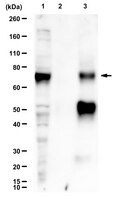ABE2599-25UL Sigma-AldrichAnti-BMAL1
Anti-BMAL1 Antibody, Cat. No. ABE2599-25UL, is a highly specific guinea pig polyclonal antibody, that targets Aryl hydrocarbon receptor nuclear translocator-like protein 1 and has been tested in Immunoprecipitation and ChIP-seq and Chromatin Immunoprecipitation (ChIP).
More>> Anti-BMAL1 Antibody, Cat. No. ABE2599-25UL, is a highly specific guinea pig polyclonal antibody, that targets Aryl hydrocarbon receptor nuclear translocator-like protein 1 and has been tested in Immunoprecipitation and ChIP-seq and Chromatin Immunoprecipitation (ChIP). Less<<Recommended Products
Overview
| Replacement Information |
|---|
| References |
|---|
| Product Information | |
|---|---|
| Format | Purified |
| Presentation | Purified guinea pig polyclonal antibody in PBS with 0.05% sodium azide. |
| Physicochemical Information |
|---|
| Dimensions |
|---|
| Materials Information |
|---|
| Toxicological Information |
|---|
| Safety Information according to GHS |
|---|
| Safety Information |
|---|
| Storage and Shipping Information | |
|---|---|
| Storage Conditions | Stable for 1 year at 2-8°C from date of receipt. |
| Packaging Information | |
|---|---|
| Material Size | 25 µL |
| Transport Information |
|---|
| Supplemental Information |
|---|
| Specifications |
|---|
| Global Trade Item Number | |
|---|---|
| Catalogue Number | GTIN |
| ABE2599-25UL | 04054839464706 |
Documentation
Anti-BMAL1 SDS
| Title |
|---|
Anti-BMAL1 Certificates of Analysis
| Title | Lot Number |
|---|---|
| Anti-BMAL1 Polyclonal Antibody | Q3027765 |







